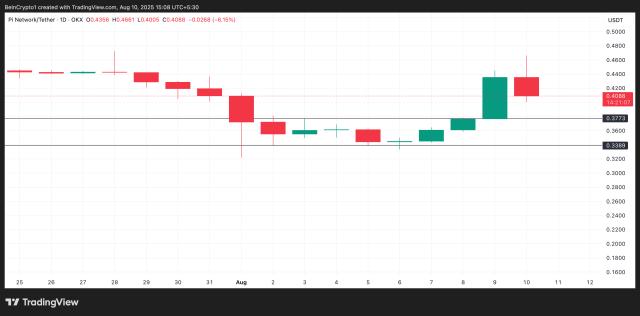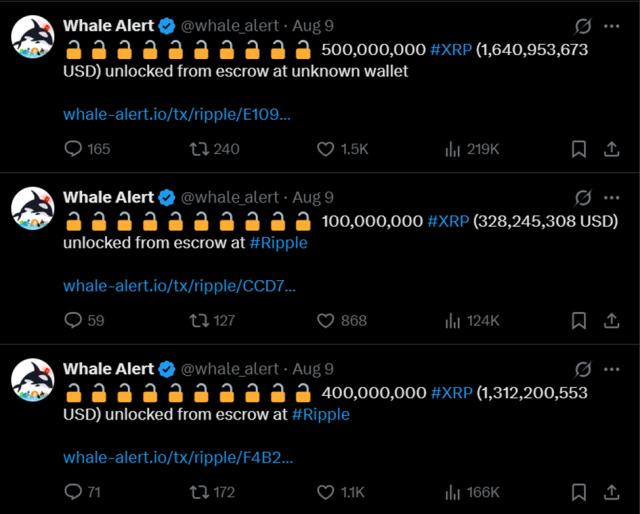
Ripple warns that the new US cryptocurrency law is too vague and could hinder innovation and push projects abroad.
The 2025 US Cryptocurrency Bill makes Ripple anxious: The regulations are unclear about the regulatory agency's role, the scope of "ancillary assets" is too broad, and overlapping regulatory risks are causing many projects and talents to shift away from the US market.
- Ripple believes the 2025 US Cryptocurrency Bill is too vague, causing overlapping regulations between SEC and CFTC.
- The "ancillary asset" concept in the bill could cause legal Tokens like XRP and Ethereum to fall under securities, negatively impacting the entire industry.
- The unclear legal environment has significantly reduced the number of cryptocurrency developers in the US, with projects and talents gradually shifting to Asia.
What is Ripple?
Ripple is a company operating a global payment network using Blockchain technology and the owner of XRP Token.
Ripple stands out in the financial sector with the goal of optimizing cross-border transactions through Blockchain, helping to save time and costs compared to traditional systems. One of Ripple's major contributions is developing XRP Token, serving fast money transfers between banks and financial institutions globally.
Ripple's solutions have been applied in many large banks, demonstrating its influence in innovating international financial infrastructure. During the 2020-2024 period, Ripple was also the focal point of legal disputes regarding cryptocurrency regulations in the US.
What is the 2025 US Cryptocurrency Bill?
The 2025 bill is an initiative by the US Senate to build a legal framework for the cryptocurrency industry, seeking input from businesses and experts.
The bill aims to divide management powers between SEC and CFTC, while standardizing concepts about digital assets and legal obligations of organizations issuing/providing cryptocurrency-related services.
This is considered an important step in shaping cryptocurrency law in the US, however, it has encountered many debates due to its general content, making practical implementation and compliance difficult.
Why is Ripple speaking out about the 2025 Cryptocurrency Bill?
After years of confrontation with SEC regarding XRP, Ripple quickly responded to the bill, emphasizing the vagueness of governance scope.
Ripple argues that the "line" between SEC's authority (managing securities-like assets) and CFTC's (managing derivative commodities) in the draft is too blurry, easily causing conflicts and making it difficult for Blockchain projects, especially for Tokens with clear historical distribution like XRP or Ethereum.
Ripple issues a warning: "Overemphasizing ancillary asset aspects could risk overlapping management, causing truly decentralized Tokens to be equated with securities — contrary to the innovative nature of Blockchain technology."
Quoted from Ripple's response to the US Senate Banking Committee, August 2025
Additionally, Ripple calls for clearly establishing power limits to prevent development organizations from dedicating too many resources to compliance instead of core technology development.
What is the "ancillary asset" concept in the bill and why does Ripple oppose it?
In the draft, "ancillary asset" is a concept referring to Tokens that may be regulated as securities if they are publicly issued and traded.
Ripple opposes this because the definition is too broad and could pull in legal, long-standing, and transparent Tokens like XRP and Ethereum into securities regulation. This would obstruct development by requiring strict compliance despite not being securities in nature.
"Just because Ethereum once conducted an initial coin offering (ICO) years ago, it might now be managed by SEC, despite widespread use in DeFi and Smart Contracts. This is a significant drawback."
Analysis by Ripple's legal team, based on the 2025 draft
Ripple suggests a modification: Tokens that have operated on public Blockchain for at least 5 years with transparent distribution history should be exempt from SEC regulation. At that point, SEC should focus on monitoring early-stage projects or those showing securities manipulation signs.
How does the ambiguity in power division between SEC and CFTC affect the cryptocurrency industry?
When power boundaries are unclear between SEC and CFTC, Blockchain projects are often "caught between two fires", worried about being considered securities while also needing to meet commodity standards.
"The inconsistent legal environment has hindered innovation speed, causing many startups and development groups to leave the US for more friendly countries."
Blockchain Workforce Migration Report, Electric Capital 2024
Each organization or project must invest significant time and costs in legal teams, interrupting actual product development paths. The "legal nightmare" atmosphere also gradually reduces long-term investor and programmer confidence in the US ecosystem.
How deeply does the brain drain and innovation decline in the US market go?
According to the 2024 Electric Capital Developer Report, the proportion of cryptocurrency developers in the US has dropped from 38% in 2015 to just 19%.
Notably, Asia now surpasses the US, accounting for 32% of global cryptocurrency developers. This trend clearly reflects the negative impact of an unclear legal environment, slow innovation, leading projects and talented personnel to shift towards markets like Singapore, South Korea, China, and Japan.
"The quality and on-chain operation scale of the US ecosystem is falling behind Asia and Europe, especially in DeFi and Web3 sectors during 2022-2025."
Quoted from Developer Report, Electric Capital 2024
This is directly related to the potential role of the United States as the "global cryptocurrency capital". If not improved, the US risks falling behind in the digital transformation era based on Blockchain.
How does Ripple propose to address this issue?
Ripple not only calls for exemptions for transparent, long-standing Tokens but also proposes establishing clear legal boundaries for each type of digital asset.
Specifically, it needs to clearly define: Tokens identified as securities will be supervised by the SEC, Tokens as commodities will be regulated by the CFTC. For decentralized Tokens that exist on an open Blockchain and have developed for at least 5 years, the focus should be on supporting development rather than constraining them with strict regulations like traditional securities.
This approach aligns with international recommendations while avoiding a "one-size-fits-all" policy that stifles technological innovation.
Explaining the United States' decline on the global cryptocurrency map
An unreasonable legal environment has caused the US to gradually lose its leading position in Blockchain talent and projects.
The 2024 report indicates that software development and Web3 application activities in the US are declining, while the number of new projects in Asia and Europe continues to increase strongly due to policies that encourage innovation, protect developers, and effectively manage risks.
| Country/Territory | Cryptocurrency Developer Market Share (2024) | Notable Achievements |
|---|---|---|
| United States | 19% | Strong legal experience, but losing advantages due to overlapping regulatory pressures |
| Asia | 32% | Leading in new project numbers, open policies, R&D support |
| Europe | 30% | Implementing legal sandboxes, increasing international talent attraction |
"If the United States does not have a breakthrough in policy, the ability to compete and retain Blockchain talent will soon belong to new centers in Asia."
Observation from the Blockchain expert group, Electric Capital 2024 report
What are the potential consequences if the legal environment for cryptocurrency in the US is not improved?
Slow legal innovation will cause the US to continue losing creative resources, shortening the development gap with other key markets.
The consequence is the slowdown of numerous Web3, NFT, DeFi, liquidation connection projects and reduced competitiveness with countries with encouraging policies like Singapore and Switzerland, thereby affecting the US's long-term position on the global digital economic map.
For the US domestic ecosystem, businesses must also "sit still" waiting for guidance, losing time verifying legality, not to mention legal costs overwhelming short-term profits.
Practical example of projects affected by legal ambiguity
A typical example is that many DApp start-ups in the US have chosen to register and develop in countries like Singapore due to clearer regulations, avoiding risks of prosecution or suspension during the experimental stage. In reality, many US programming teams have migrated to Asia to establish themselves, accessing larger early-stage capital and facing fewer legal barriers.
Similarly, after the SEC's lawsuit with Ripple regarding XRP, confidence in the regulatory agency has significantly decreased among many large investors, triggering a wave of asset transfers to foreign wallets and overseas exchanges.
Focused comparison between the 2025 US draft law and prominent cryptocurrency policies in Asia
| Criteria | US Draft 2025 | Singapore (Asian exemplar) |
|---|---|---|
| Token Classification Method | Based on derivative asset concepts, without specific guidelines | Clear grouping: Utility Token, Payment Token, Security Token |
| Primary Regulatory Agency | SEC / CFTC, with overlapping risks | MAS (Monetary Authority of Singapore) unified management |
| Experimental Support Policy | No clear Sandbox policy | Sandbox supporting ICO, DApp since 2017 |
| Developer Protection | Lack of exemption regulations for decentralized ecosystem builders | Clear exemptions for qualified projects, ensuring programmer rights |
The comparison shows that advanced Asian markets are moving faster thanks to breakthrough legal frameworks and specialized digital asset type categorization — something the US still lacks.
Forecast of cryptocurrency ecosystem development trends if the US continues to slow legal innovation
Without appropriate adjustments, venture capital flows, core Blockchain projects, NFT projects, and skilled engineering teams in the US will continue to migrate overseas. Moreover, legal risk concerns will make traditional institutions cautious, reducing collaboration with DeFi start-ups. This will negatively impact the application speed of Blockchain in modern financial life.
Additionally, the US's central position in the Web3 era is increasingly being challenged by Asia and Europe — regions with faster cryptocurrency law issuance and update speeds, with specific characteristics suitable for development needs in each specific stage.
What solutions can help the US improve its position in the cryptocurrency field?
First, quickly complete clear legislation defining the jurisdiction limits of the SEC and CFTC — avoiding overlap, and simultaneously considering short-term exemptions or incentives for decentralized, public pioneer projects. Second, a scientific Token classification standard aligned with international practices needs to be introduced, combined with Sandbox testing to accompany and protect creators from excessive criminalization risks.
Third, the US government should listen to and regularly dialogue with developer communities and Blockchain associations, thereby making proactive modifications based on ecosystem operational practices, instead of applying traditional regulations to new digital asset types.
If these proposals are implemented well, they will not only address concerns about falling behind but also help the United States maintain its leadership role in the global financial technology revolution.
Frequently Asked Questions
Will the 2025 US Cryptocurrency Law require all Token types to register with the SEC?
Not all Tokens are mandatory, but the overly broad definition of "subsidiary assets" in the current draft could potentially apply to decentralized Tokens, causing significant debate. A clear exemption mechanism is needed to avoid hindering transparent and long-established projects.
What adjustments does Ripple propose for the draft law?
Ripple wants Tokens operating on public, transparent Blockchain and existing for over 5 years to be exempt from SEC regulation, while clearly defining which organizations have the right to supervise each type of asset.
How do disagreements about power between SEC and CFTC affect technological innovation in the United States?
It creates numerous legal risks, increases compliance costs, slows down new product development progress, and causes many projects and founders to move to other countries.
What is the current ratio of cryptocurrency developers in the US compared to Asia?
According to the Electric Capital 2024 report, the US has 19%, while Asia has surpassed with 32% of total industry developers.
What risks exist if the US continues to delay cryptocurrency policy adjustments?
It will lose global leadership, lose talent – projects, reduce startup investment capital flow, and prolong the domestic innovation freeze.
What experiences can the US learn from Asian countries?
It should clearly categorize Tokens, unify a single management point, apply Sandbox, and implement developer protection and encouragement policies like Singapore.
How can the Blockchain development environment in the US become more attractive?
A transparent legal framework is needed, reducing compliance burden and increasing support for innovation through testing programs and frequent dialogue with the development community.







